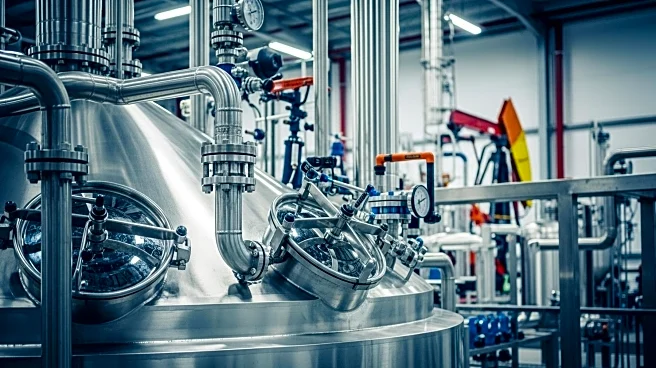What's Happening?
Clean Food Group (CFG) has acquired a one-million-liter fermentation facility from Algal Omega 3 Ltd, which was in administration. This acquisition allows CFG to expand its production of sustainable oils and fats derived from yeast fermentation. Founded in 2022, CFG aims to reduce production costs and sale prices of microbial oils, positioning itself as a leader in the sustainable oils market. The facility, located in Knowsley, Liverpool, is now the largest of its kind globally, and CFG has already completed commercial-scale production, manufacturing two tonnes of oil in a recent run. The expansion is part of CFG's strategy to capitalize on a $20 billion market opportunity.
Why It's Important?
The acquisition is significant as it accelerates CFG's entry into the market, bypassing the traditional, costly path of building new facilities. This move is expected to lower costs and increase the availability of sustainable oils, which are crucial for industries looking to reduce their environmental impact. The facility's production capabilities will support CFG's efforts to meet growing demand for sustainable alternatives to tropical oils, which are often associated with deforestation and biodiversity loss. The expansion also highlights the potential for biotechnology to drive innovation in sustainable food production.
What's Next?
CFG plans to advance its Series A funding round to further capitalize on market opportunities. The company aims to expand its product offerings and increase production capacity to meet global demand. The new facility will be managed by Bill Thurston, who brings extensive experience in food manufacturing. CFG's focus on sustainable oils positions it to play a key role in the bio-industrial revolution, with potential applications in food, cosmetics, and other industries.
Beyond the Headlines
The acquisition reflects a broader trend towards sustainable and regenerative practices in the food industry. CFG's approach to using yeast fermentation for oil production offers a promising alternative to traditional methods that rely on environmentally damaging sources. This development could pave the way for more companies to adopt similar technologies, contributing to a more sustainable global food system.










